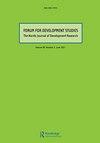政治学知识与选举暴力:肯尼亚和津巴布韦的经验
IF 1.1
Q3 DEVELOPMENT STUDIES
引用次数: 2
摘要
摘要政治学教育和研究在选举中的相关性是显而易见的,但它们的实际作用并不明显。我们特别关注政治学教育和研究对肯尼亚和津巴布韦和平投票的贡献。在这两个国家,选举暴力伴随着多党竞争。为了从比较的角度,特别是关于选举暴力的研究成果,了解政治学学术成果和影响,我们采用了涵盖整个非洲大陆出版物的文献计量分析。科学网和Sabinet数据库提供了肯尼亚和津巴布韦相当数量的选举专业知识的可靠图片。为了了解政治科学家在各国选举政治中的作用,以及他们在公众参与和公共决策中的参与或缺乏参与,我们对在那里的大学工作的政治科学家进行了半结构化采访。我们的研究揭示了与肯尼亚政治权力种族化和津巴布韦经济衰退有关的结构性障碍。尽管学术资格受到尊重,教师享有就政治问题发表意见的自由,但自我审查和挫败感被认为阻碍了学者加强和平投票的能力。本文章由计算机程序翻译,如有差异,请以英文原文为准。
Political Science Knowledge and Electoral Violence: Experiences From Kenya and Zimbabwe
Abstract
The relevance of political science education and research in the conduct of elections is evident, but their actual roles are not. We zero in, specifically, on the contribution of political science education and research to peaceful polling in Kenya and Zimbabwe. In both countries, electoral violence has accompanied multi-party competition. To get a profile of political science scholarly production and impact, from a comparative perspective, particularly research output on electoral violence, we employ bibliometric analyses covering publications from the whole African continent. Web of Science and Sabinet databases provide a reliable picture of a fair amount of elections expertise in Kenya and Zimbabwe. In order to approach the role of political scientists in the countries’ electoral politics as well as their participation, or lack of it, in public engagement and public decision-making, we have conducted semi-structured interviews of political scientists working in universities there. Our study reveals structural obstacles related to the ethnicization of political power in Kenya and the economic decline in Zimbabwe. Although academic qualifications were respected and the faculty enjoyed freedom to express opinions on political issues, self-censorship and frustration were identified as hampering the ability of scholars to enhance peaceful polling.
求助全文
通过发布文献求助,成功后即可免费获取论文全文。
去求助
来源期刊

FORUM FOR DEVELOPMENT STUDIES
DEVELOPMENT STUDIES-
CiteScore
1.80
自引率
14.30%
发文量
24
期刊介绍:
Forum for Development Studies was established in 1974, and soon became the leading Norwegian journal for development research. While this position has been consolidated, Forum has gradually become an international journal, with its main constituency in the Nordic countries. The journal is owned by the Norwegian Institute of International Affairs (NUPI) and the Norwegian Association for Development Research. Forum aims to be a platform for development research broadly defined – including the social sciences, economics, history and law. All articles are double-blind peer-reviewed. In order to maintain the journal as a meeting place for different disciplines, we encourage authors to communicate across disciplinary boundaries. Contributions that limit the use of exclusive terminology and frame the questions explored in ways that are accessible to the whole range of the Journal''s readership will be given priority.
 求助内容:
求助内容: 应助结果提醒方式:
应助结果提醒方式:


